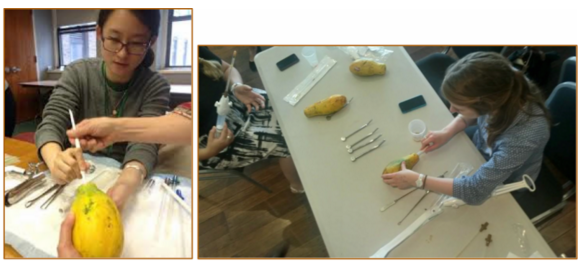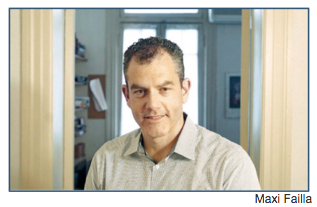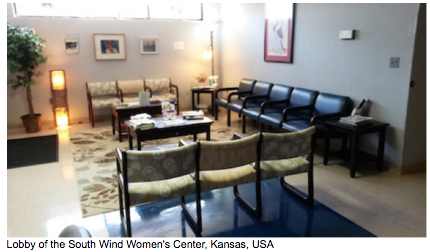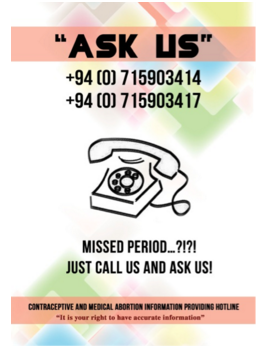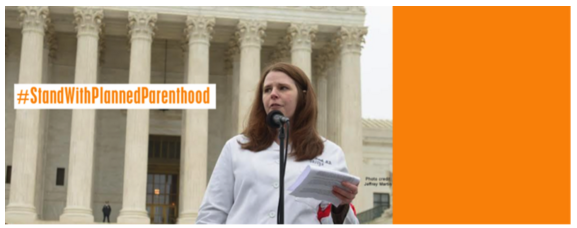
“Papaya Workshops”- A reflection from a medical student participant at the Children by Choice Conference, 2015
by Tessa Moody, 6th year medical student, Adelaide University
16 June 2015
It was an insightful and empowering experience to be involved in the “Papaya Workshop” – a hands-on activity designed to educate medical students and practitioners about manual vacuum aspiration and D&C as safe termination techniques.
The session was led by Dr Ea Mulligan – director of the Pregnancy Advisory Centre in South Australia. Dr Mulligan began with a short presentation on the procedures, to give some context to the practical session; indications, precautions, and the techniques were explained.
The practical session followed, and was supervised by a group of medical practitioners who routinely provide abortion services, and were experienced in the procedures. Each participant in the workshop had access to a papaya as a model uterus, and had a chance to practice vacuum aspiration and D&C using the standard equipment for each procedure. Participants could ask for guidance from the roaming doctors as needed, who were available to answer questions and refine techniques.
The session demystified and destigmatised the common termination procedures. Participants were initially very cautious (being extra careful not to ‘perforate’ the papaya uterus – an accident that we were alarmed to discover could be done quite easily!), but gained confidence in the techniques under the supervision of the tutors.
Earlier in the week, the Children by Choice conference discussed the issues of poor access to abortion services in Australia, particularly in rural areas. The facts about minimal providers, too few facilities and restrictive laws were undeniably disheartening. However, it was uplifting to be exposed to the basic procedures, and imagine that it would be an entirely achievable goal to train more willing medical practitioners to become safe abortion providers.
As a pro-choice medical student, I found the workshop empowering; it allowed me to consider that I could one day develop these skills further, and ultimately assist women facing an unplanned pregnancy. Additionally, it was a privilege to be in contact with doctors who support women’s choices and provide abortion services – it was heartening to talk with these role models, and learn from those who are passionate about caring for women and protecting their choices.
INDONESIA
The future of abortion access from a young doctor’s perspective
by Audrey Natalia, Cilandak Marine Hospital, South Jakarta
23 July 2015
http://asap-asia.org/blog/#sthash.WdCAGpNf.UX11N2x1.dpuf
…Every day a quarter of a million women around the world step into the clinics looking for physicians who can help them get safe and legal abortion they desperately need. Unfortunately, they are often denied abortion services due to existing local abortion laws. For example, in Indonesia, abortion is only permitted in case of rape or incest or to save a woman’s life. Abortion is not permitted to preserve a woman’s physical and mental health, or because of fetal impairment. In most cases, the result of these rejections are catastrophic unsafe abortions..
Abortion laws go deeper than restricting women’s human rights, they also affect the medical students’ curriculum; thus, affecting future health care providers. Medical students are not provided appropriate reproductive health training, such as abortion counselling, hands-on abortion training and post-abortion training. Being medically trained at the world’s fourth most populous country with an anti-abortion medical school curriculum gives me an incredibly clear idea how lack of access to abortion training makes it impossible for young doctors to help patients with unintended pregnancy…
ARGENTINA/USA
An Interview with Dan Grossman
by Silvina Heguy
14 June 2015
http://www.pressreader.com/argentina/clarin/20150614/282041915758128/TextView
“It is hard to understand that there are safe methods for abortion and then not use them, even in cases that are allowed by law. WHO recommends misoprostol, a medication for safe abortion, that is sold in Argentina, yet it is approved only to treat gastric ulcers.”
Dan Grossman was trained as a doctor in the universities of Yale and Stanford in the United States, but he travels and does research in Latin America and Africa to help to improve women’s health. He arrived in Buenos Aires to participate in the conference of the Red de Acceso al Aborto Seguro de Argentina (Network for Access to Safe Abortion of Argentina, REDAAS), a network of health professionals and lawyers who work in the public health services and who provide legal abortions and the Centro de Estudios de Estado y Sociedad (Centre for Study of the State and Society, CEDES).
He came out of the meeting impressed with the participants, who it seemed might never stop asking detailed questions, asking for more data and sharing experiences. “It’s a great pleasure to find people in the public health services so committed to improving the lives of women,” he says… We asked: how do you evaluate the situation of Argentina regarding the sexual and reproductive health of women? He replies: “There is a contradiction to observe when you see how good the health system is and yet you know that the most important cause of maternal death is related to unsafe abortion. It is a real shame and a contradictory situation that misoprostol is available to treat gastric ulcers, and yet is not approved for its use as recommended by WHO for safe abortion…
[Article is in Spanish]
USA
“I know so many people whose lives have been positively impacted by Planned Parenthood. We cannot afford to lose the professional and compassionate care that this organization provides.” Dr Kathleen Morrell, Reproductive Health Advocacy Fellow, Physicians for Reproductive Health
TO all US Americans!!
Take action today! Tell your Senators to vote NO on defunding Planned Parenthood.
Why I provide
Physicians for Reproductive Health
5 June 2015
https://www.youtube.com/watch?v=vBhJwo16yTU
[In the USA] 97% of all obstetrician/gynaecologists will encounter a patient who needs an abortion. But only 14% of those physicians provide them.
Featuring five abortion providers from our network of doctors, this short video highlights why each of them considers it an honor and a privilege to provide abortion care. With so many legislative attacks on the ability to provide care, this video emphasizes why doctors continue this vital work in the face of mounting restrictions. Ultimately, they will all tell you that they are motivated to provide by their patients’ lives and well-being.
USA
by Paul Brink
24 June 2015
Oftentimes in the reproductive rights community we tend to focus on the stories of abortion providers and clinic escorts, both of whom are rightly considered heroic to the movement. But while these spotlights are justified, there are other stories that are then overlooked. Many people don’t think about administrative staff at a clinic, and how important they are to ensuring patients get comfortable, compassionate, and respectful care.
Clinic staff are the people who are on the front lines of patient care in many ways. They are the ones to answer the phones to take appointments, helping the patients through what can be a time of crisis. They confirm that patients know what to expect with the procedure and make sure they have the resources they need before coming to the appointment. They also offer counseling and information services, which can include discussing contraceptive options following the appointment, as well as looking for warning signs of abuse in relationships, either when the patient may be hiding this appointment from their partner, or when their partner might be coercing them into the procedure.
[The rest of the article is based on interviews staff at the South Wind Women’s Center in Kansas. Some of the issues they deal with include making appointments, funding abortions, addressing the needs of survivors of intimate partner violence, clinic-focused violence by anti-abortion, informing patients of regulations which include anti-abortion regulations imposed by the state.]
UK
Being an abortion doctor has taught me a lot about life
22 June 2015
…I can’t say this is exactly what I had in mind when I was 17… Probably not what my parents were thinking of either – it doesn’t make for great dinner party conversation having an abortion doctor for a daughter… but somehow here I am… now nearing the end of my abortion-care training. If I’m honest, I haven’t found it emotionally easy (and I suspect neither have those closest to me!) but I’d never go back and change that decision. Not only have I received excellent tuition, but, perhaps more importantly, I have learnt much about life from the women I have cared for. They have taught me that pregnancy at the wrong time, with the wrong person, or in the wrong situation, can be a very lonely and unsympathetic place to be…
I have performed 21 abortions today, ending pregnancies in women aged from 16 to 44, who have travelled from as far as Northern Ireland to regain control over their own bodies. I have carefully sieved through aspirate to identify the tiny translucent jelly-fish-like gestation sac at five weeks. I have painstakingly removed a foetus part by part at 23 weeks and watched the ultrasound image of the uterus shrink back to size. I have heard 21 stories of 21 difficult decisions, some agonising, others more straightforward, but not one of them taken lightly. One woman made it as far as the operating table and changed her mind. I wiped away another woman’s silent tears as the anaesthetist counted her down from 10 as he put her under.
The staff in the clinic show boundless compassion. They strike the perfect balance of being sensitive to the enormity of the situation for each individual while not making too big a deal of it. I suppose this is their everyday, their normal and they are experienced at what they do: there is no lack of demand for abortion work…
I’ve seen as many professional women in their 40s as chaotic girls in their teens; and the majority have been using some form of contraception, albeit unsuccessfully. Many of the women are already mums. Some are devoutly religious. Some have been advised to have an abortion of a much-wanted pregnancy for medical reasons or severe foetal abnormalities. One woman I encountered had been trying to conceive for many years and finally got pregnant by IVF, only to be given this devastating recommendation…
It has not yet become my everyday and my normal. I wonder if it will ever feel like that. As I leave clinic, I actually feel slightly elated from the work – I have learnt skills far beyond my expectations and I feel gratified to have been involved in helping women out in a vulnerable and sometimes desperate time.
SRI LANKA
Why do Sri Lankan women need access to safe, legal and affordable abortion services??
28 May 2015
Even under restricted laws, specialized abortion services are somewhere accessible in Colombo and in other larger towns. But the issue is whether every woman who needs abortions can afford that kind of service. When these services are too costly, women tend to look for less expensive alternatives which are not safe at all. It is only a few who are able to access information on medical abortion as well. Authorities for abortion do not yet approve even mifepristone and misoprostol; women have to buy the pills in the black market or from pharmacies, which are very expensive. Though they are able to find and buy pills there is no proper platform where women can access information on medical abortion. ASAP youth champions in Sri Lanka realized the need of access to information on medical abortion plus accurate information on contraceptives. Respecting the right to information, activists launched “ASK US” a hotline which provides information on contraceptives and medical abortion. The callers are able to get accurate information based on the guidelines of WHO. The hotline respects the choices of women by reminding them of their options and by letting them take decisions about their own bodies themselves. The hotline has not only been providing information but has been giving psychological support for women and girls throughout. It was a difficult road to launch the hotline with so much criticism and stigma regarding abortion. Even under so much criticism the hotline has reached its second month, receiving more and more calls each day supporting and empowering women with needs and questions. Did your friend, sister, daughter, girlfriend, wife or neighbour miss her period?! Don’t hesitate. Call us. Ask us! Be informed and make informed choices!




